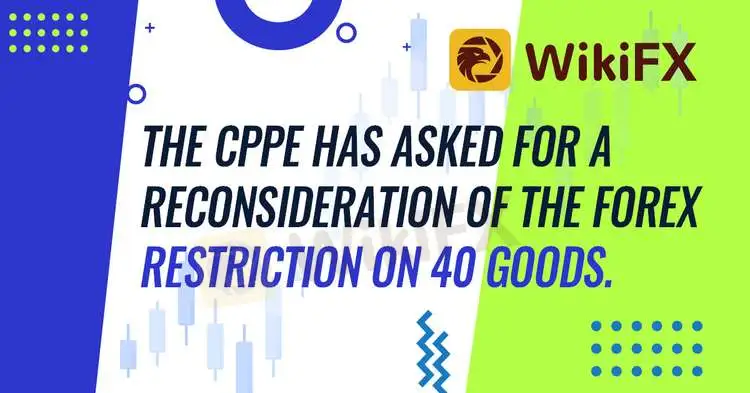简体中文
繁體中文
English
Pусский
日本語
ภาษาไทย
Tiếng Việt
Bahasa Indonesia
Español
हिन्दी
Filippiiniläinen
Français
Deutsch
Português
Türkçe
한국어
العربية
THE CPPE HAS ASKED FOR A RECONSIDERATION OF THE FOREX RESTRICTION ON 40 GOODS.
Abstract:The Centre for the Promotion of Private Enterprise (CPPE) has encouraged the Central Bank of Nigeria to reconsider its restriction on some of the more than 40 commodities for which the regulator has barred importers from obtaining foreign exchange.

The Centre for the Promotion of Private Enterprise (CPPE) has encouraged the Central Bank of Nigeria to reconsider its restriction on some of the more than 40 commodities for which the regulator has barred importers from obtaining foreign exchange.
The organization also criticized the Nigeria Customs Service's decision to reintroduce excise duty on soft drink manufacturers in the nation, calling it ill-timed, insensitive, and unsuitable given the country's current tough economic and commercial conditions.
The Centre, headed by Dr. Muda Yusuf, its Chief Executive Officer, stated this in its recently issued economic and business environment evaluation for 2021 and agenda for 2022.
According to the CPPE, the CBN must involve stakeholders since the existing FX policy regime is harming investors, manufacturers, and other stakeholders.
“In order to lessen the drain on foreign reserves, the CBN has prohibited over 40 goods from access to foreign exchange through the official window,” it stated.
Some of the items on this list are intermediary goods for some manufacturing enterprises, which has harmed some of them. It would be prudent for the CBN to undertake a vigorous dialogue with stakeholders in the New Year in order to evaluate this list.
According to the organization, the CBN should implement a freely floating exchange rate policy regime and enable pricing mechanisms in the forex market to reflect demand and supply fundamentals.
Our proposal is to implement a freely floating exchange rate approach based. We would like to emphasize that this is not a proposal for devaluation. Rather, it is a pricing system that reflects the realities of demand and supply in the forex market. It is a system that is long-term, predictable, and open. It is a policy framework that would eliminate uncertainty and instill investor confidence.

Disclaimer:
The views in this article only represent the author's personal views, and do not constitute investment advice on this platform. This platform does not guarantee the accuracy, completeness and timeliness of the information in the article, and will not be liable for any loss caused by the use of or reliance on the information in the article.
Related broker
Read more

Indonesia officially joins the BRICS countries
Indonesia's decision to join the BRICS group will not only enhance economic cooperation within BRICS countries but is also expected to have a profound impact on global trade, investment, and the currency system.

Attention! Goldman Sachs Cuts Gold Target to $2910
As the Fed slows rate cuts, gold's price growth may be limited. Goldman Sachs revised its short-term forecast, expecting gold to reach $3,000 per ounce by mid-2026.

Inflation Rebounds: ECB's Big Rate Cut Now Unlikely
German inflation has surged once again, exceeding the 2% target for the second consecutive time. The overall inflation rate for the Eurozone, which is expected to be released on Tuesday, is also likely to show a slight increase, diminishing expectations for a large interest rate cut by the European Central Bank (ECB).

Malaysian Pilot Loses RM1.36 Million in UVKXE Investment App Scam
A Malaysian pilot, aged 50, has suffered a staggering financial loss of RM1,366,885 to a fraudulent investment scheme promoted via Instagram. The scheme involved an app called UVKXE, which claimed to offer attractive investment opportunities.
WikiFX Broker
Latest News
Ghana Trader Jailed for $300K Forex and Crypto Scam
US Dollar Surge Dominates Forex Market
Hong Kong Police Bust Deepfake Crypto Scam Syndicate Involving $34 Million
Is it a good time to buy Korean Won with the current depreciation?
Pepperstone Sponsored the "Aston Martin Aramco Formula One Team"
ACY Securities Integrates MetaTrader 5 to Enhnace Copy Trading Service
Soegee Futures Review: Should You Trust This Broker?
Malaysian Pilot Loses RM1.36 Million in UVKXE Investment App Scam
Indonesia officially joins the BRICS countries
Attention! Goldman Sachs Cuts Gold Target to $2910
Currency Calculator






